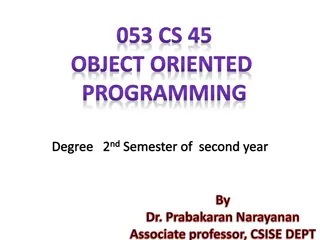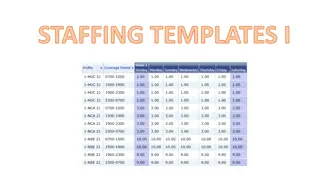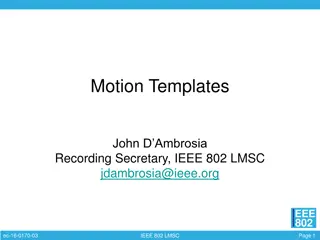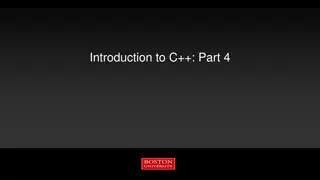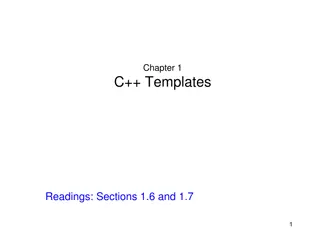C++ Templates for Generic Programming
How C++ templates can enhance code reusability and flexibility by allowing a single set of code to work for any data type. Learn how to create templated functions and classes, enabling generic programming for various data types such as integers, doubles, strings, and more.
Download Presentation

Please find below an Image/Link to download the presentation.
The content on the website is provided AS IS for your information and personal use only. It may not be sold, licensed, or shared on other websites without obtaining consent from the author.If you encounter any issues during the download, it is possible that the publisher has removed the file from their server.
You are allowed to download the files provided on this website for personal or commercial use, subject to the condition that they are used lawfully. All files are the property of their respective owners.
The content on the website is provided AS IS for your information and personal use only. It may not be sold, licensed, or shared on other websites without obtaining consent from the author.
E N D
Presentation Transcript
1 CSCI 104 Templates Mark Redekopp David Kempe Sandra Batista Aaron Cote
2 Function Templates Example reproduced from: http://www.cplusplus.com/d oc/tutorial/templates/ Consider a max() function to return the max of two int's But what about two double's or two strings Define a generic function for any type, T Can then call it for any type, T, or let compiler try to implicitly figure out T int max(int a, int b) { if(a > b) return a; else return b; } double max(double a, double b) { if(a > b) return a; else return b; } Non-Templated = Multiple code copies template<typename T> T max(const T& a, const T& b) { if(a > b) return a; else return b; } int main() { int x = max<int>(5, 9); //or x = max(5, 9); // implicit max<int> call double y = max<double>(3.4, 4.7); // y = max(3.4, 4.7); } Templated = One copy of code
3 Motivating Example #ifndef LIST_INT_H #define LIST_INT_H struct IntItem { intval; IntItem*next; }; class ListInt{ public: ListInt(); // Constructor ~ListInt(); // Destructor void push_back(int newval); ... private: IntItem* head_; }; #endif Suppose we ve built a list to store integers But what if we want a list of double s or string's or other objects We would have to define the same code but with different types What a waste! Enter C++ Templates Allows the one set of code to work for any type the programmer wants The type of data becomes a parameter #ifndef LIST_DBL_H #define LIST_DBL_H struct DoubleItem { doubleval; DoubleItem*next; }; class ListDouble{ public: ListDouble(); // Constructor ~ListDouble(); // Destructor void push_back(double newval); ... private: DoubleItem* head_; }; #endif
4 Templates // declaring templatized code template <typename T> struct Item { T val; Item<T>* next; }; Allows the type of variable in a class or function to be a parameter specified by the programmer Compiler will generate separate class/struct code versions for any type desired (i.e instantiated as an object) LList<int> my_int_list causes an int version of the code to be generated by the compiler LList<double> my_dbl_list causes a double version of the code to be generated by the compiler template <typename T> class LList { public: LList(); // Constructor ~LList(); // Destructor void push_back(T newval); ... private: Item<T>* head_; }; // Using templatized code // (instantiating templatized objects) int main() { LList<int> my_int_list; LList<double> my_dbl_list; my_int_list.push_back(5); my_dbl_list.push_back(5.5125); double x = my_dbl_list.pop_front(); int y = my_int_list.pop_front(); return 0; }
5 Template Mechanics (2) Writing a template Precede class with: template <typename T> Use T or other identifier where you want a generic type Precede the definition of each function with template <typename T> In the scope portion of the class member function, add <T> Since Item and LList are now templated, you can never use Item and LList alone You must use Item<T> or LList<T> #ifndef LIST_H #define LIST_H template <typename T> struct Item { T val; Item<T>* next; }; template <typename T> class LList{ public: LList(); // Constructor ~LList(); // Destructor void push_back(T newval); T& at(int loc); private: Item<T>* head_; }; template<typename T> LList<T>::LList() { head_ = NULL; } template<typename T> LList<T>::~LList() { } template<typename T> void LList<T>::push_back(T newval) { ... } #endif
6 Exercise Recall that maps/dictionaries store key,value pairs Example: Map student names to their GPA How many key,value type pairs are there? string, int int, double Etc. Would be nice to create a generic data structure Define a Pair template with two generic type data members "Billy Bruin" 2.5 "Helga Harvard" 4.3 "Tommy Trojan" 3.7 "Daisy Duck" 2.5
7 Another Example A pair struct: template<typename T1, typename T2> struct pair { T1 first; T2 second; pair(const T1& f, const T2& s); }; template<typename T1, typename T2> pair<T1,T2>::pair( const T1& f, const T2& s); : first(f), second(s) { }
8 Templates #ifndef LIST_H #define LIST_H Usually we want you to write the class definition in a separate header file (.h file) and the implementation in a .cpp file Key Fact: Templated classes must have the implementation IN THE HEADER FILE! Corollary: Since we don't compile .h files, you cannot compile a templated class separately Why? Because the compiler would have no idea what type of data to generate code for and thus what code to generate template <typename T> struct Item { T val; Item<T>* next; }; template <typename T> class LList{ public: LList(); // Constructor ~LList(); // Destructor void push_back(T newval); private: Item<T>* head_; }; #endif List.h #include "List.h" template<typename T> LList<T>::push_back(T newval) { if(head_ = NULL){ head_ = new Item<T>; // how much memory does an Item // require? } } List.cpp
9 Templates #ifndef LIST_H #define LIST_H The compiler will generate code for the type of data in the file where it is instantiated with a certain type template <typename T> struct Item { T val; Item<T>* next; }; template <typename T> class LList{ public: LList(); // Constructor ~LList(); // Destructor void push_back(T newval); T& at(int loc); private: Item<T>* head_; }; Main.cpp #include "List.h" int main() { LList<int> my_int_list; LList<double> my_dbl_list; template<typename T> LList<T>::LList() { head_ = NULL; } my_int_list.push_back(5); my_dbl_list.push_back(5.5125); double x = my_dbl_list.pop_front(); int y = my_int_list.pop_front(); return 0; } template<typename T> LList<T>::~LList() { } template<typename T> void LList<T>::push_back(T newval) { ... } // Compiler will generate code for LList<int> when compiling main.cpp List.h #endif
10 Templates & Inheritance #include "llist.h" template <typename T> class Stack : private LList<T>{ public: Stack(); // Constructor void push(const T& newval); T const & top() const; }; For various reasons the compiler may have difficulty resolving members of a templated base class When accessing members of a templated base class provide the full scope or precede the member with this-> template<typename T> Stack<T>::Stack() : LList<T>() { } template<typename T> void Stack<T>::push(const T& newval) { // call inherited push_front() push_front(newval); // may not compile LList<T>::push_front(newval); // works this->push_front(newval); // works } template<typename T> void Stack<T>::push(const T& newval) { // assume head is a protected member if(head) return head->val; // may not work if(LList<T>::head) // works return LList<T>::head->val; if(this->head) // works return this->head->val; }
11 "typename" & Nested members #include <iostream> #include <vector> using namespace std; For various reasons the compiler will have difficulty resolving nested types of a templated class whose template argument is still generic (i.e. T vs. int) Precede the nested type with the keyword 'typename' when you are Not in the scope of the templated class AND The template type is still generic Why? Research template specialization and read https://en.wikipedia.org/wiki/T ypename template <typename T> class Stack { public: void push(const T& newval) { data.push_back(newval); } T& top(); private: std::vector<T> data; }; When the template type is still generic and you scope a nested type, precede with typename template <typename T> T& Stack<T>::top() { vector<T>::iterator it = data.end(); // bad typename vector<T>::iterator it = data.end(); //good return *(it-1); } When the template type is specific there is no need to use typename int main() { Stack<int> s1; vector<int>::iterator it; s1.push(1); s1.push(2); s1.push(3); cout << s1.top() << endl; return 0; }




